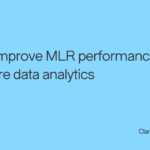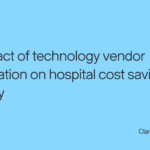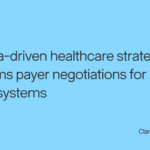It’s impossible to run a successful accountable care organization (ACO) without data interoperability. Interconnected data is vital for many facets of ACOs, including patient information, care coordination, quality measurement, population health management, value-based reimbursement, research, and analytics. By facilitating the seamless exchange and utilization of data, strong interoperability standards enhance an organization’s ability to deliver accountable, patient-centered care while achieving better outcomes and cost efficiencies. Some of the most critical data points that ACOs must pay attention to are those related to physician performance. Having an accurate evaluation of this performance is needed to promote accountability and enable targeted improvements in the healthcare delivery process. ACOs face some challenges when acquiring and sharing physician performance data. One is the lack of data standardization and compatibility — inconsistent data formats and incompatible IT systems across different healthcare providers often hinder effective data sharing, making it difficult to reliably measure physician performance. Concerns surrounding data security and privacy are another major challenge. Some ACOs feel they must balance the need for transparency and collaboration among healthcare providers with the imperative to protect sensitive patient information. ACOs must adhere to strict regulatory requirements like HIPAA to guarantee patients’ privacy rights are respected, and data breaches can lead to severe legal and ethical consequences. With poor data sharing and standardization, case-mix adjustment and benchmarking of provider performance suffer. When organizations don’t have the whole picture of a physician’s attributed patients or a large enough sample to compare physicians in an apples-to-apples manner, the results may be biased or inaccurate, making it harder to engage physicians in change management programs. As an ACO embarks on the path to achieve greater data connectivity, it must realize what interoperability means in a healthcare context — this means understanding the connection between strong data sharing and care quality. Interoperability ensures that ACOs can provide coordinated and personalized patient care and enables continuous evaluation and improvement of care practices. ACOs will have a tough time maintaining and improving their care quality if they don’t have the right data. ACOs should also note the relationship between interoperability and cost-effectiveness. Better data integration enables ACOs to seamlessly share and utilize data, leading to more informed decision-making, timely interventions, and optimized use of resources. With seamless data sharing, ACOs can transform their operations by making smarter decisions and establishing more targeted care practices and referral behavior. Access to timely, trustworthy data gives organizations a holistic view of their patients. This facilitates a deeper understanding of individual health needs and identifies care gaps so that ACOs can make data-informed decisions regarding care plans and interventions. Furthermore, data interoperability empowers ACOs to generate evidence-based insights that can shape policy formation and advocacy efforts. They can leverage interoperable data to demonstrate the impact of coordinated care, quality improvement initiatives, and cost-saving measures. These insights can influence policy discussions, reimbursement models, and regulatory frameworks, ultimately shaping policies that support the ACO model. In addition to improvements in quality, cost efficiency, and decision-making, interoperability can strengthen physician accountability. Regular monitoring motivates physicians to practice at the top of their licenses, and they can learn valuable lessons by reviewing their own data. Looking at things from patient point of view, it’s clear that better data connectivity can promote trust. The transparent sharing of physician performance data and the ability to provide coordinated care plans enhances patients’ faith and satisfaction with ACOs for a few reasons. For starters, this data transparency allows patients to make informed decisions about their healthcare providers — they can assess the quality, outcomes, and patient experiences associated with different physicians. Second, ACOs give patients individualized treatment plans tailored to their specific needs, enhancing patient satisfaction. These customized care plans focus on the patient’s unique health concerns, preferences, and goals. Coordinated care within ACOs guarantees more seamless communication and collaboration among healthcare providers, which is also highly beneficial for patients. This connectivity reduces fragmentation, eliminates redundant tests or treatments, and enhances care continuity. When patients perceive that their care is well-coordinated and cohesive, it bolsters their trust in the healthcare system and increases their confidence in the ACO model. One of the most crucial parts of an ACO’s strategy for improved data sharing and better physician performance evaluation is the adoption of healthcare data analytics software. This technology allows ACOs to aggregate, analyze and visualize healthcare data, making monitoring physician performance easier. A major benefit of data analytics software is its ability to drive better patient outcomes. The software can analyze vast amounts of patient data, including medical records, lab results, and treatment histories. This helps providers identify patterns, trends, and insights that might otherwise go unnoticed. With this knowledge, clinicians can make more informed decisions and deliver more personalized care. Data analytics software can also facilitate population health management by identifying high-risk groups and enabling preventive interventions, and boosting cost efficiency in ACOs. By examining data from various sources — like patient records, financial systems, and supply chain management platforms — the technology can identify areas of waste and cost variation. This information enables healthcare organizations to optimize resource allocation, streamline operations and reduce unnecessary expenses. Implementing fixed data collection and reporting protocols can enhance data compatibility across different systems, thereby promoting effective data sharing and reliable physician performance measurement. But this data must be continuously protected — ACOs can prioritize compliance by introducing strict data security measures and keeping up with changing data privacy laws. Though there are some hurdles to overcome, leading ACOs recognize and are investing in the capabilities needed to unlock the benefits of improved data sharing — from helping patients enjoy long-lasting health to cost savings to better health policy. Healthcare stakeholders should come together sooner rather than later to create an interoperable, data-driven ACO ecosystem. One of the most crucial steps an ACO can take to improve data sharing is to partner with a reliable enterprise analytics platform — like Clarify Health.Challenges in Sharing Data on Physician Performance within ACOs
The Imperative of Data Interoperability in ACOs
Strategies for Enhanced Data Sharing and Physician Performance Evaluation
Impact of Effective Data Sharing and Interoperability on ACOs
- Author Details





